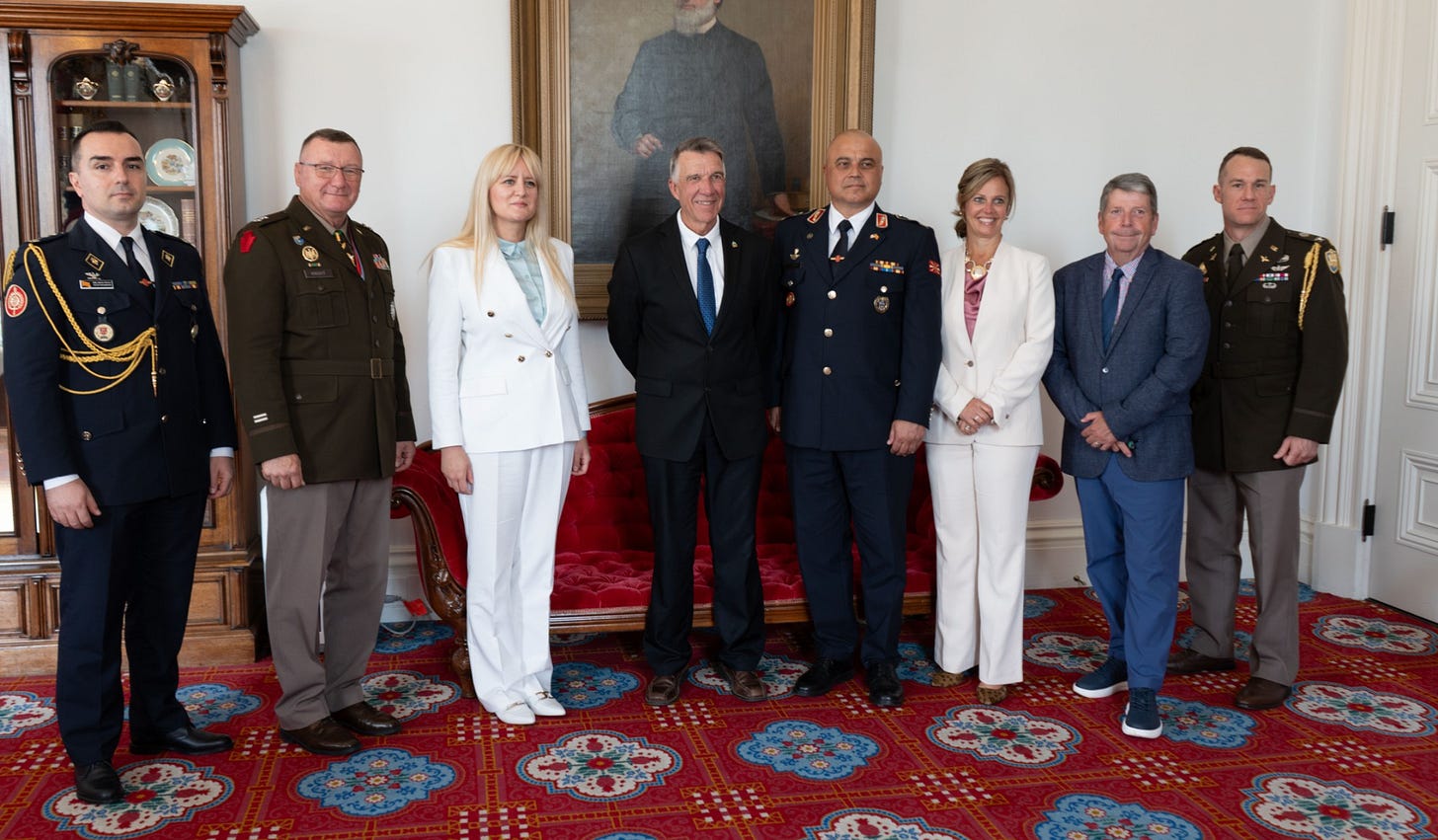How Vermont's Partnership with North Macedonia Has Grown Well Beyond Its Original Mission
The bond was forged in shared deployments, most notably when Vermont Guardsmen served alongside their Macedonian counterparts in Afghanistan, a testament to the trust built between the two forces.
MONTPELIER, Vt. – When a delegation from the Balkan nation of North Macedonia toured the Vermont State House and met with Governor Phil Scott this past Monday, it was far more than a standard diplomatic visit. For many Vermonters, North Macedonia might seem a world away, but this meeting was the latest chapter in a surprisingly deep, three-decade-long story of partnership that is now expanding from military cooperation to our farms, businesses, and universities.
So, why do these high-level officials keep coming to Vermont? The answer lies in a unique initiative called the State Partnership Program.
The Explainer: A Guard-Led Bridge to the World
Established by the U.S. Department of Defense after the Cold War, the State Partnership Program pairs state National Guards with the armed forces of developing nations. The Vermont National Guard has been partnered with North Macedonia since 1993, making it one of the longest-running partnerships in the program.
According to the Vermont National Guard, the initial goal was to help the newly independent nation of North Macedonia build a democratic, NATO-compatible military. For years, that meant Vermont soldiers and airmen sharing expertise in everything from helicopter maintenance to non-commissioned officer development. The bond was forged in shared deployments, most notably when Vermont Guardsmen served alongside their Macedonian counterparts in Afghanistan, a testament to the trust built between the two forces.
But as this week’s visit made clear, the relationship is evolving.
From Camouflage to Commerce
The July 28th discussions in Montpelier focused squarely on the future. Governor Scott, alongside Secretary of Commerce and Community Development Lindsay Kurrle and Secretary of Agriculture Anson Tebbets, met with the delegation to explore new avenues for cooperation. As reported by the U.S. Embassy in North Macedonia, the talks highlighted “economic opportunity and education exchange” as key priorities moving forward.
This signals a deliberate shift to leverage the strong military-to-military relationship for broader civilian benefit. For Vermonters, this is where the partnership gets particularly interesting. There are striking similarities between our Green Mountain State and the mountainous Balkan nation:
Agriculture and Craft Beverage: North Macedonia has a rich agricultural tradition and a burgeoning wine industry, with a growing focus on organic production. Reports from the Macedonian Chamber of Commerce detail a landscape of small, family-owned vineyards and farms, a model familiar to anyone acquainted with Vermont's local food scene. The involvement of Secretary Tebbets underscores a serious interest in sharing knowledge on everything from dairy practices to agritourism.
Mountain Life and Tourism: Both Vermont and North Macedonia are defined by their rugged, mountainous terrain. A U.S. Army report recently highlighted how a Vermont soldier brought his mountain warfare expertise to a NATO training exercise in North Macedonia's Shar Mountains. This shared topography creates a natural foundation for collaboration not just in military training, but also in developing four-season adventure tourism, a cornerstone of both economies.
Education and Cybersecurity: The delegation also met with leaders at Norwich University, a national leader in cybersecurity education. According to reports from North Macedonian news agency MIA, a key topic was renewing a student and faculty exchange program. With the Vermont National Guard actively engaged in cyber defense cooperation, a pipeline between Norwich’s world-class programs and North Macedonia’s defense and tech sectors presents a powerful, modern dimension to the partnership.
A Family of Partnerships
This model of expanding partnerships is a Vermont strategy. Our state is also partnered with Senegal and, more recently, Austria. The relationship with Senegal has already blossomed beyond military exchanges. A report from the National Guard highlighted the new sister-city relationship between Burlington and Thies-East, Senegal, a direct outgrowth of the state partnership that fosters cultural and civic ties.
The visit from North Macedonia serves as a reminder that Vermont's influence and connections run deeper than many might realize. What began as a mission to mentor a fledgling military has matured into a comprehensive relationship between two peoples who, despite the distance, share a common appreciation for mountainous landscapes, local economies, and an independent spirit. The positive discussions at the State House suggest that the next 30 years of this partnership will be just as much about shared prosperity as they are about shared security.


